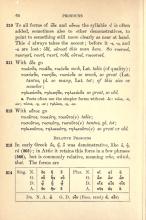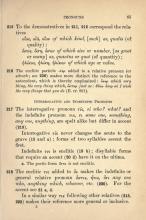213. In early Greek ὅς, ἥ, ὅ was demonstrative, like ὁ, ἡ, τό (§ 205). In Attic it retains this force in a few phrases (§ 560), but is commonly relative, meaning who, which, that. The forms are:
215. To the demonstratives in §§ 211 and 212 correspond the relatives
|
οἷος, |
οἵᾱ, |
οἷον |
of which kind, (such) as |
|
ὅσος, |
ὅση, |
ὅσον |
of which size or number, (as great or many) as |
|
ἡλίκη, |
ἡλίκον |
of which age or value |
216. The enclitic particle -περ added to a relative pronoun (or adverb; see § 236) makes more distinct the reference to the antecedent, which is thereby emphasized.
ὅπερ which very thing, the very thing which
ὥσπερ just as
θέλω ἅπερ σύ
I wish the very things that you do.
Eur. Ipheginia in Tauris, 991



